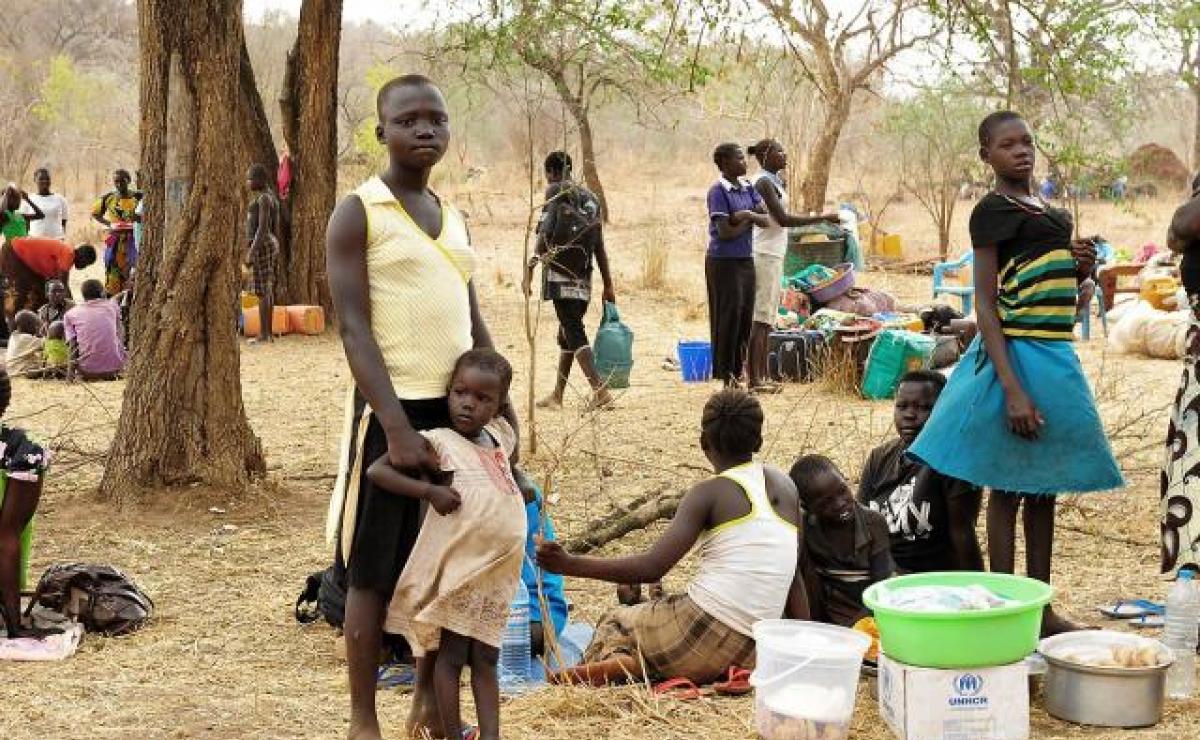More than one million refugees in Uganda

East Africa’s largest refugee crisis needs more support
"The militia shoot at anybody, we have lost mothers, fathers, siblings and children to their attacks," says 35-year-old Watson Odaga, a South Sudanese refugee in Palabek settlement, Northern Uganda. Men and boys have been kidnapped for forced conscription, he adds. Others talk about rape, abductions and attacks while fleeing to Uganda on foot.
Hearing testimonies like these has become regular for The Lutheran World Federation (LWF) staff working in Uganda. For more than 12 months, they have been receiving refugees from South Sudan. As the fighting continues to spread in South Sudan’s East Equatoria province, thousands are forced out of their homes every day.
Uganda, already the country hosting most refugees in Africa, continues to take in the majority of them. The number of South Sudanese refugees in the country recently surpassed one million. 85 percent are women and children. The United Nations refugee agency UNHCR reports an average arrival of 1,800 people a day during the last 12 months.
Despite the challenges generated by the new influx from South Sudan, Uganda maintains one of the most progressive policies to refugee protection. The government upholds an open-door-policy, and grants refugees freedom of movement, the right to seek employment and establish businesses, and access to public services such as education. Refugees in Uganda do not live in camps but in settlements, and are allocated a plot of land to provide for their livelihoods. Because of that, Uganda is regarded as a model for many other refugee-hosting countries.
Overwhelming needs
In a summit on the global refugee crisis, leaders of all 193 UN member states in September 2016 committed to the protection and integration of refugees. The Ugandan Office of the Prime Minister (OPM), responsible for refugees in the country, adapted the Comprehensive Refugee Response Framework (CRRF) which was outlined on that summit to the Ugandan context. Among others, OPM committed to maintain and support Uganda’s progressive policy towards refugees, to protect asylum space, and to support the host communities.
LWF, one of the first organizations to respond to the emergency, is one of the organizations who help implementing that framework.
“We have hired 86 additional staff since January 2017 to assist the South Sudanese refugees. Over the course of the year LWF has provided aid to over 433,000 refugees in Northern Uganda,” Paul Orikushaba, LWF Program Coordinator, says. Despite that added capacity more funding is needed to live up to the commitments of the CRRF.
“Vulnerable refugees such as the elderly, families fostering unaccompanied children and people with disabilities usually receive fully constructed houses, everybody else is given construction material,” Orikushaba says to give an example. “At the moment however, many of them remain without houses for a long time as we are working with limited funds and prioritize the most vulnerable ones.”
Appeal for support
Orikushaba says more funding is needed in every sector where LWF works: Unaccompanied minors and survivors of gender-based violence need more protection houses. Protection officers call for more security lights in dark areas to prevent attacks on women and girls, sensitization campaigns on gender-based violence and support to survivors.
“Education and health facilities in the settlements are inadequate. The road network needs to be repaired Currently the state of the roads limits our ability to deliver services to refugees in some parts of the settlements,” Orikushaba continues. He also mentions that there is a much greater demand for livelihoods initiatives in refugee settlements and host communities.
The biggest challenge however is the provision of clean water. “LWF has drilled 250 boreholes in and around the settlements of Adjumani, Palorinya and Palabek for both refugees and host communities. Each refugee receives an average of 16 litres of water per day,” Richard Wakholi, LWF Water, Sanitation and Hygiene (WASH) advisor, explains. While this is meeting just barely the humanitarian standards in emergencies, most of the water is delivered daily with large water trucks - an expensive and unsustainable method.
“We need more money to provide for all those people who have come looking for safety,” Orikushaba says. “Uganda is playing its part by hosting the refugees but can’t respond to the emergency alone.”
LWF is a member of the national stakeholder’s forum on the Universal Periodic Review (UPR), leading the cluster of organizations engaged in working with refugees. In that role, LWF makes specific recommendations for the rights of refugees at the UN Human Rights Council. LWF follows up such recommendations through engagements with the government to build on Uganda’s Comprehensive Refugee Response Framework.

